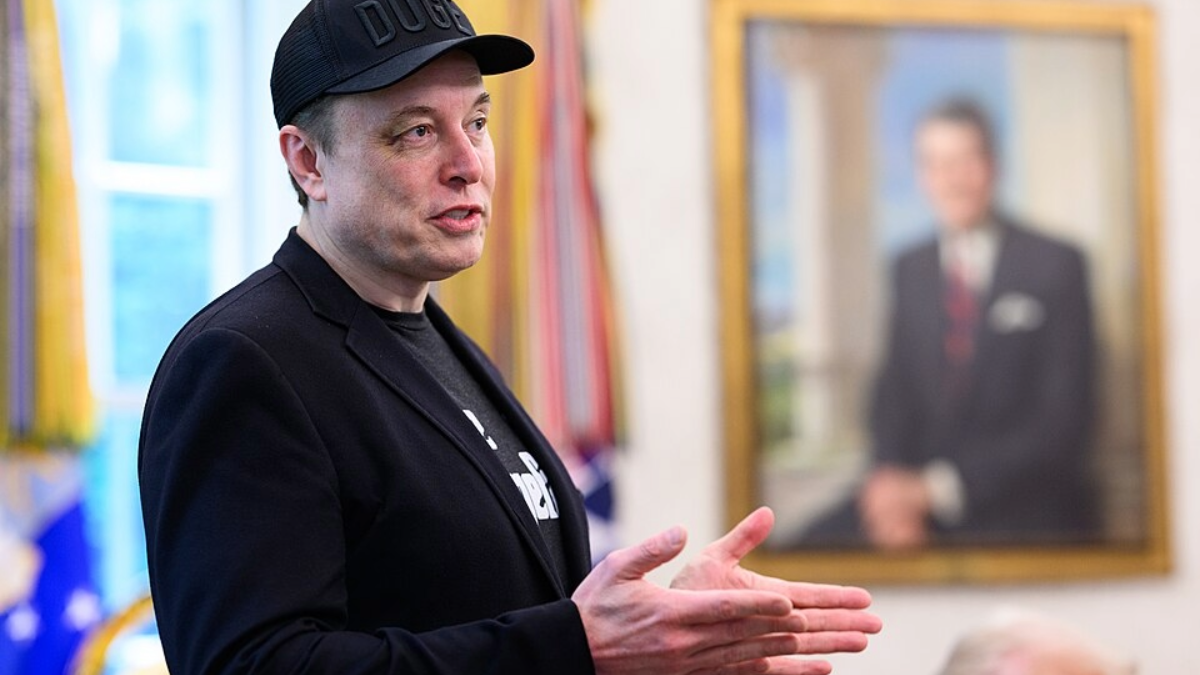DOGE’s Flops Shouldn’t Spell Doom for AI In Government
Nathan Sanders, Bruce Schneier / Sep 5, 2025
Elon Musk participates in a press conference with about his departure from DOGE in the White House Oval Office on May 30. (Official White House Photo by Molly Riley)
Just a few months after Elon Musk’s retreat from his unofficial role leading the Department of Government Efficiency (DOGE), we have a clearer picture of his vision of government powered by artificial intelligence, and it has a lot more to do with consolidating power than benefitting the public. Even so, we must not lose sight of the fact that a different administration could wield the same technology to advance a more positive future for AI in government.
To most on the American left, the DOGE end game is a dystopic vision of a government run by machines that benefits an elite few at the expense of the people. It includes AI rewriting government rules on a massive scale, salary-free bots replacing human functions and nonpartisan civil service forced to adopt an alarmingly racist and antisemitic Grok AI chatbot built by Musk in his own image. And yet despite Musk’s proclamations about driving efficiency, little cost savings have materialized and few successful examples of automation have been realized.
From the beginning of the second Trump administration, DOGE was a replacement of the US Digital Service. That organization, founded during the Obama administration to empower agencies across the executive government with technical support, was substituted for one reportedly charged with traumatizing their staff and slashing their resources. The problem in this particular dystopia is not the machines and their superhuman capabilities (or lack thereof) but rather the aims of the people behind them.
One of the biggest impacts of the Trump administration and DOGE’s efforts has been to politically polarize the discourse around AI. Despite the administration railing against “woke AI”’ and the supposed liberal bias of Big Tech, some surveys suggest the American left is now measurably more resistant to developing the technology and pessimistic about its likely impacts on their future than their right-leaning counterparts. This follows a familiar pattern of US politics, of course, and yet it points to a potential political realignment with massive consequences.
People are morally and strategically justified in pushing the Democratic Party to reduce its dependency on funding from billionaires and corporations, particularly in the tech sector. But this movement should decouple the technologies championed by Big Tech from those corporate interests. Optimism about the potential beneficial uses of AI need not imply support for the Big Tech companies that currently dominate AI development. To view the technology as inseparable from the corporations is to risk unilateral disarmament as AI shifts power balances throughout democracy. AI can be a legitimate tool for building the power of workers, operating government and advancing the public interest, and it can be that even while it is exploited as a mechanism for oligarchs to enrich themselves and advance their interests.
A constructive version of DOGE could have redirected the Digital Service to coordinate and advance the thousands of AI use cases already being explored across the US government. Following the example of countries like Canada, each instance could have been required to make a detailed public disclosure as to how they would follow a unified set of principles for responsible use that preserves civil rights while advancing government efficiency.
Applied to different ends, AI could have produced celebrated success stories rather than national embarrassments.
A different administration might have made AI translation services widely available in government services to eliminate language barriers to US citizens, residents and visitors, instead of revoking some of the modest translation requirements previously in place. AI could have been used to accelerate eligibility decisions for Social Security disability benefits by performing preliminary document reviews, significantly reducing the infamous backlog of 30,000 Americans who die annually awaiting review. Instead, the deaths of people awaiting benefits may now double due to cuts by DOGE. The technology could have helped speed up the ministerial work of federal immigration judges, helping them whittle down a backlog of millions of waiting cases. Rather, the judicial systems must face this backlog amid firings of immigration judges, despite the backlog.
To reach these constructive outcomes, much needs to change. Electing leaders committed to leveraging AI more responsibly in government would help, but the solution has much more to do with principles and values than it does technology. As historian Melvin Kranzberg said, technology is never neutral: its effects depend on the contexts it is used in and the aims it is applied towards. In other words, the positive or negative valence of technology depends on the choices of the people who wield it.
The Trump administration’s plan to use AI to advance their regulatory rollback is a case in point. DOGE has introduced an “AI Deregulation Decision Tool” that it intends to use through automated decision-making to eliminate about half of a catalog of nearly 200,000 federal rules . This follows similar proposals to use AI for large-scale revisions of the administrative code in Ohio, Virginia and the US Congress.
This kind of legal revision could be pursued in a nonpartisan and nonideological way, at least in theory. It could be tasked with removing outdated rules from centuries past, streamlining redundant provisions and modernizing and aligning legal language. Such a nonpartisan, nonideological statutory revision has been performed in Ireland — by people, not AI — and other jurisdictions. AI is well suited to that kind of linguistic analysis at a massive scale and at a furious pace.
But we should never rest on assurances that AI will be deployed in this kind of objective fashion. The proponents of the Ohio, Virginia, congressional and DOGE efforts are explicitly ideological in their aims. They see “AI as a force for deregulation,” as one US senator who is a proponent put it, unleashing corporations from rules that they say constrain economic growth. In this setting, AI has no hope to be an objective analyst independently performing a functional role; it is an agent of human proponents with a partisan agenda.
The moral of this story is that we can achieve positive outcomes for workers and the public interest as AI transforms governance, but it requires two things: electing leaders who legitimately represent and act on behalf of the public interest and increasing transparency in how the government deploys technology.
Agencies need to implement technologies under ethical frameworks, enforced by independent inspectors and backed by law. Public scrutiny helps bind present and future governments to their application in the public interest and to ward against corruption.
These are not new ideas and are the very guardrails that Trump, Musk and DOGE have steamrolled over the past six months. Transparency and privacy requirements were avoided or ignored, independent agency inspectors general were fired and the budget dictates of Congress were disrupted. For months, it has not even been clear who is in charge of and accountable for DOGE’s actions. Under these conditions, the public should be similarly distrustful of any executive’s use of AI.
We think everyone should be skeptical of today’s AI ecosystem and the influential elites that are steering it towards their own interests. But we should also recognize that technology is separable from the humans who develop it, wield it and profit from it, and that positive uses of AI are both possible and achievable.
Authors

